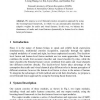Free Online Productivity Tools
i2Speak
i2Symbol
i2OCR
iTex2Img
iWeb2Print
iWeb2Shot
i2Type
iPdf2Split
iPdf2Merge
i2Bopomofo
i2Arabic
i2Style
i2Image
i2PDF
iLatex2Rtf
Sci2ools
100
click to vote
ACII
2007
Springer
2007
Springer
Combining Audio and Video by Dominance in Bimodal Emotion Recognition
We propose a novel bimodal emotion recognition approach by using the boosting-based framework, in which we can automatically determine the adaptive weights for audio and visual features. In this way, we balance the dominances of audio and visual features dynamically in feature-level to obtain better performance.
| Added | 12 Aug 2010 |
| Updated | 12 Aug 2010 |
| Type | Conference |
| Year | 2007 |
| Where | ACII |
| Authors | Lixing Huang, Le Xin, Liyue Zhao, Jianhua Tao |
Comments (0)

